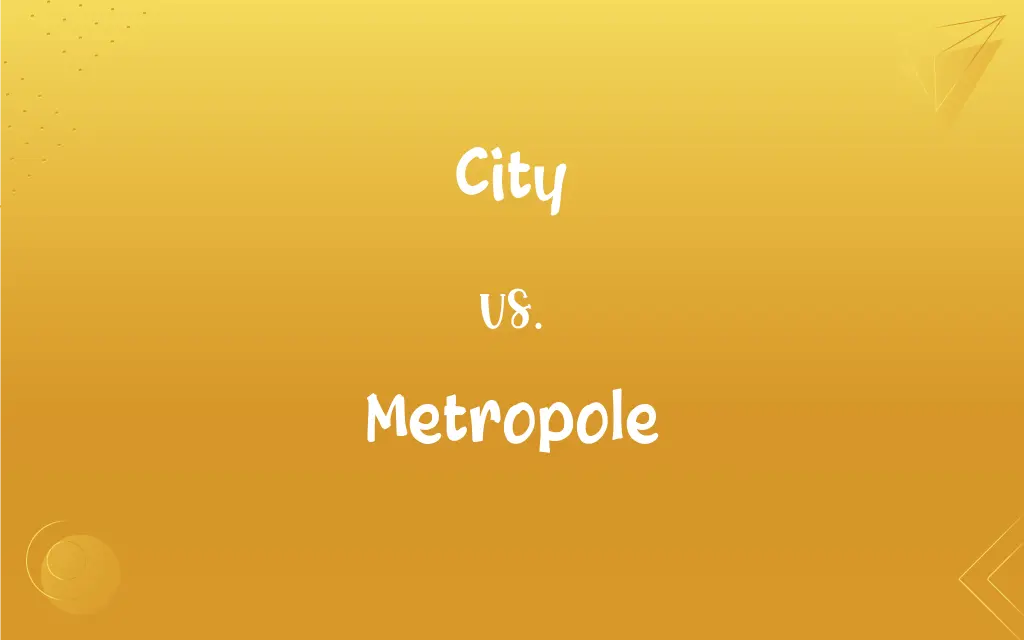City vs. Metropole: What's the Difference?
Edited by Aimie Carlson || By Janet White || Updated on November 30, 2023
A city is a large or important town, whereas a metropole (or metropolis) refers to the capital or chief city of a country or region, often serving as a hub of cultural, economic, and political activities.

Key Differences
A city is typically a large and densely populated urban area, recognized for its importance in terms of residential settlements, businesses, and amenities. Conversely, a metropole, often known as a metropolis, extends beyond the idea of a city. It usually signifies a primary city, often the capital, that leads a region or country in terms of politics, culture, and economy.
In terms of governance, a city is governed by its own municipal authorities, focusing on local urban issues and development. On the other hand, a metropole often holds a higher status in governance, sometimes overseeing a network of surrounding cities and towns, making it a pivotal point of regional or national governance.
Economically, cities are centers for various businesses and industries, providing employment and living spaces for residents. Metropoles take this a step further, often being the economic powerhouses of a region, housing major corporations' headquarters, financial markets, and being a hub for international business.
Culturally, cities offer a blend of local arts, entertainment, and lifestyle. Metropoles, however, are usually culturally diverse and influential, hosting significant cultural events, international art exhibitions, and serving as centers for media and entertainment industries.
In terms of infrastructure and amenities, cities are equipped with necessary facilities like transportation, education, and healthcare. Metropoles, being larger and more significant, often boast advanced and extensive infrastructure, including international airports, major universities, and specialized medical facilities.
ADVERTISEMENT
Comparison Chart
Size and Population
Smaller, less populous than a metropole.
Larger and more populous, often encompassing surrounding areas.
Economic Role
Economic centers with varied businesses.
Economic powerhouses, often with international business presence.
Cultural Influence
Local cultural hubs with regional influence.
Major cultural centers with national or international influence.
Governance
Governed by municipal authorities.
May have broader governance influence, sometimes overseeing surrounding areas.
Infrastructure
Adequate urban facilities and services.
Advanced and extensive infrastructure, often including international amenities.
ADVERTISEMENT
City and Metropole Definitions
City
A city is an incorporated urban municipality with local government.
Chicago is a city known for its influential architecture and political history.
Metropole
A metropole is the chief or capital city of a country or region, central in governance.
London, the metropole of the United Kingdom, is an epicenter of British politics and culture.
City
A city is a significant center of education, healthcare, and public services.
Boston, a city known for its rich history, is home to prestigious universities and hospitals.
Metropole
A metropole is a primary urban center influencing surrounding regions economically and culturally.
As a metropole, Tokyo exerts significant cultural and economic influence over Japan.
City
A city is an area distinguished by particular characteristics of urban life.
Las Vegas, a city in Nevada, is famous for its bustling nightlife and casinos.
Metropole
A metropole is known for its extensive infrastructure, encompassing advanced facilities.
The metropole of New York City boasts some of the world's most advanced urban infrastructures.
City
A city is a large town with a dense population and significant urban development.
New York City is renowned for its vibrant culture and towering skyscrapers.
Metropole
A metropole refers to a large city that acts as a hub for international connections and activities.
Paris, a global metropole, attracts millions of tourists annually for its fashion, art, and cuisine.
City
A city is a major hub for business, transport, and cultural activities.
San Francisco, a city on the west coast, is famous for its tech industry and iconic Golden Gate Bridge.
Metropole
A metropole is a melting pot of diverse cultures, with significant global impact.
As a metropole, Mumbai is a melting pot of diverse cultures and a powerhouse of the Indian film industry.
City
A center of population, commerce, and culture; a town of significant size and importance.
Metropole
A colonial or imperial power, considered in relation to its colonies or empire.
City
An incorporated municipality in the United States with definite boundaries and legal powers set forth in a charter granted by the state.
Metropole
The capital city of such a power.
Metropole
A metropolis; the main city of a country or area.
Metropole
The parent-state of a colony.
Metropole
A bishop's see.
Metropole
A metropolis.
FAQs
Can a city also be a metropole?
Yes, some cities can also be metropoles if they serve as the primary urban center in a region or country.
What makes a metropole significant?
A metropole is significant due to its central role in governance, economy, culture, and international connections.
What defines a city?
A city is defined as a large, densely populated urban area with its own municipal government.
Can a city become a metropole?
Yes, a city can evolve into a metropole if it gains prominence in political, economic, or cultural aspects at a regional or national level.
Are cities always urban areas?
Yes, cities are urban areas characterized by higher population density and advanced infrastructure compared to rural areas.
Is a metropole always the largest city in a region?
A metropole is often the largest or most influential city, but not always the biggest in terms of area or population.
What are the typical features of a city?
Typical features of a city include high population density, urban infrastructure, diverse businesses, and cultural amenities.
Is public transportation important in cities?
Public transportation is crucial in cities for efficient movement of people and reduction of traffic congestion.
Do all countries have a metropole?
Most countries have a metropole, usually the capital or the most influential city in the country.
What is a metropole?
A metropole is a major city, often the capital, that leads a country or region in political, economic, and cultural aspects.
How does a city differ from a town?
A city is typically larger and more developed than a town, often having more complex governance and infrastructure.
How does living in a metropole differ from living in a city?
Living in a metropole often involves experiencing a more diverse and dynamic environment compared to smaller cities.
Can a metropole exist without being a capital city?
Yes, a metropole can exist without being a capital if it holds significant economic, cultural, or political influence.
How do metropoles impact their surrounding areas?
Metropoles often influence surrounding areas through economic activities, cultural exchanges, and governance policies.
Do metropoles have diverse populations?
Metropoles typically have diverse populations due to their role as economic and cultural hubs attracting people from various backgrounds.
Do cities have suburbs?
Yes, cities often have suburbs, which are residential areas on the outskirts of the urban core.
Are cities independent of rural areas?
Cities are distinct from rural areas but often depend on them for resources like food and labor.
Is the economy of a metropole diverse?
Metropoles typically have diverse economies, encompassing various industries and international business.
Are all metropoles coastal cities?
Not all metropoles are coastal; many are inland but still hold significant influence.
How do cities affect regional development?
Cities drive regional development through industrial growth, employment opportunities, and urbanization.
About Author
Written by
Janet WhiteJanet White has been an esteemed writer and blogger for Difference Wiki. Holding a Master's degree in Science and Medical Journalism from the prestigious Boston University, she has consistently demonstrated her expertise and passion for her field. When she's not immersed in her work, Janet relishes her time exercising, delving into a good book, and cherishing moments with friends and family.
Edited by
Aimie CarlsonAimie Carlson, holding a master's degree in English literature, is a fervent English language enthusiast. She lends her writing talents to Difference Wiki, a prominent website that specializes in comparisons, offering readers insightful analyses that both captivate and inform.































































